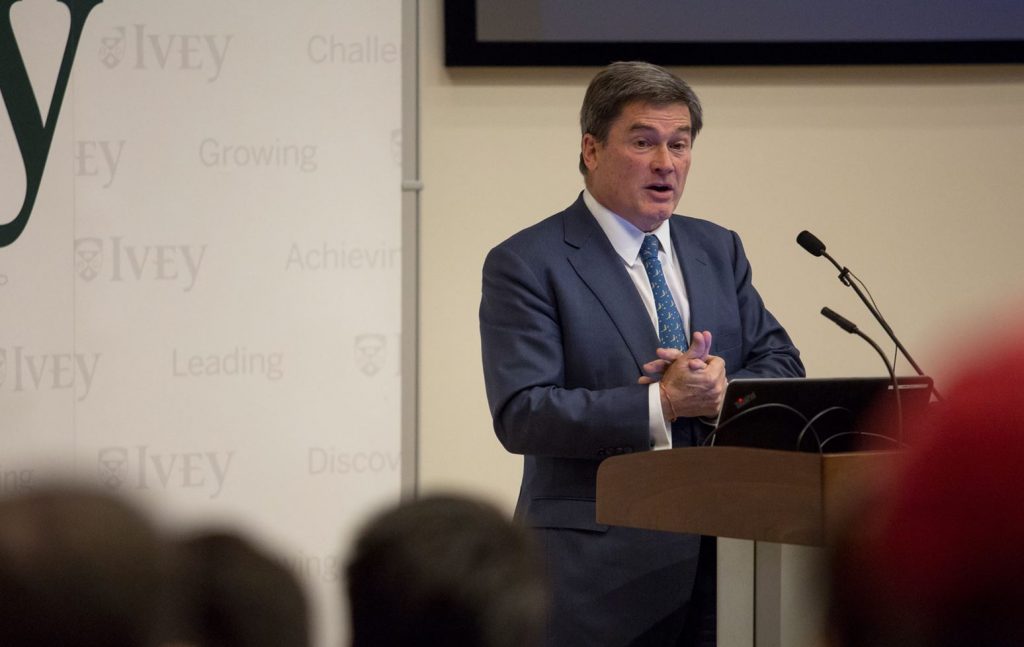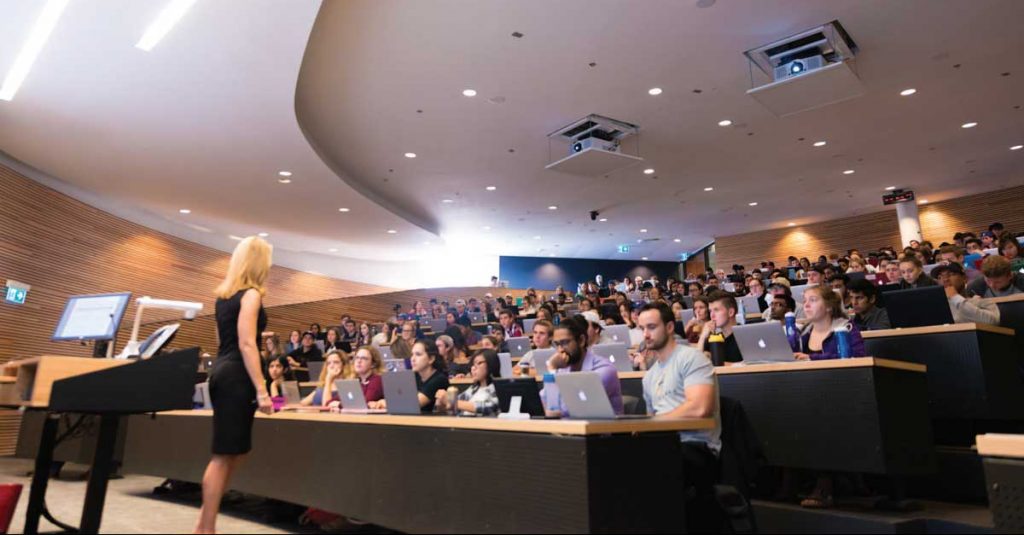The Best Toronto Business School Internship Opportunities

Toronto is known as one of the major financial centers in North America, and boasts a high concentration of banks and brokerage firms in its bustling Financial District. The city is also home to the Toronto Stock Exchange—the world’s seventh-largest stock exchange by market capitalization.
Will Canadian Customers Adapt to the “Basic” Airline Standard? – Toronto News

Catch up on all the exciting Toronto business schools new from the past week below.
Air Canada, WestJet Offer Cheap Basic Economy Fares for No-Frill Seekers – CBC/Radio-Canada
CBC News sought the expertise of airline analyst and York University Schulich School of Business professor Fred Lazar for an article that examined the intricacies of “basic economy” fares. Though these fares, which offer cheaper seating and even fewer benefits than standard economy, have been popular in the United States, they have only recently been adopted by AirCanada and WestJet.
Though the thought of a cheap flight is tantalizing, basic economy definitely has its drawbacks. Passengers who take advantage of the cheap fares will not earn points (Aeroplan miles or Westjet dollars) with the airlines, cannot change their flights, are ineligible for refunds, and cannot upgrade their seats.
Though some predict the limiting and cost-effective option will see backlash from dissatisfied passengers, Lazar predicts Canadian travelers will adapt quickly to the no-frills travel option.
“Just like when [airlines] started charging for food, charging for blankets, pillows, there were complaints. You rarely get them nowadays,” Lazar said.
Learn more about Canadian airlines’ “basic economy” option here.
Why Students Make Their Ideas Commercial Faster – Forbes
This week, a Forbes article about student entrepreneurs featured a paper authored by three experts, including University of Toronto’s Rotman School of Management professor Joshua Gans. The book, “Control Versus Execution: Endogenous Appropriability and Entrepreneurial Strategy,” whose other authors include Kenny Ching of University College and Scott Stern of MIT Sloan, explored entrepreneurship in technological innovation.
The researchers looked at the successes of student-led and faculty-led entrepreneurial endeavors and found that students prioritize bringing an idea to fruition quickly, rather than obtaining intellectual property assets. Forbes used the findings in the paper to suggest that student entrepreneurs are more successful due to their emphasis on speed over caution.
“Our analysis suggests that student entrepreneurs, with less time and with less access to university intellectual property institutions, are more likely to choose an execution-oriented strategy. Compared to University faculty, who are more likely to be patient, wait for delayed market entry and pursue a control-oriented strategy with formal protection.” – Kenny Ching
Learn more about why student entrepreneurs are often successful here.
New Course Explores Intersection of Business and Community – McMaster’s Brighter World Daily News
First year students in the Integrated Business and Humanities (IBH) program at McMaster University’s Degroote School of Business have been traveling to downtown Hamilton to attend a weekly class at CityLAB. CityLAB is a hub that allows students from community institutions (McMaster University, Redeemer University College, and Mohawk College) to collaborate with municipal staff and engage with the community to tackle pressing projects and issues.

Integrated Business and Humanities meet at the CityLAB space / Photo via dailynews.mcmaster.ca
“It’s a totally new way of learning,” said IBH student Yael Morris. “We’re finding out how we can apply social innovation not just to business, but to our everyday lives so we can build relationships and interact with people in our communities.”
The class, IBH 1AD3 allows students to gain a new perspective on challenges facing their community, and to tackle these challenges from a business perspective. IBH was a collaboration between that Business and Humanities faculties aimed at producing industry leaders apt to address societal issues such as sustainability and business ethics.
“Through a combination of instruction, community-based guest speakers, field trips and projects, students have been learning about the concepts that underpin community engagement and social innovation, as well as about social enterprise and the business models used by community organizations.”
Read more about McMaster’s CityLAB course here.
Rotman Receives $6 Million Endowment, and More – Toronto News

This week, some of Toronto’s most prominent business schools have seen a wealth of exciting news (including actual wealth in Rotman’s case, in the form of a sizeable donation). We’ve rounded up some of the most exciting recent news from Toronto metro’s business schools.
Private Donations Give Specialty Programs a Shot in the Arm – The Globe and Mail
Over 20 years since the University of Toronto received a $15 million donation from the Rotman family, changing its name from the Faculty of Management to the current Rotman School of Management, the philanthropic family once again returned a sizable gift to the Toronto business school.
The new $6 million donation will boost the school’s healthcare management programs, according to the Globe and Mail. As well, the family gifted the school an additional $1 million to help “the reach of an award-winning program for Indigenous entrepreneurs.”
“The latest Rotman family donation is earmarked for three initiatives: recruitment of three faculty research chairs in artificial intelligence, life sciences commercialization and health economics and policy; scholarships for graduate students in health care management studies; and support for a new global executive MBA for health care and life sciences.”
You can learn more about the Rotmans’ donation here.
Schulich Researchers Analyze Canada’s Multicultural Marketplace – yFile
A new York University Schulich School of Business study from professors Ela Veresiu and Markus Giesler—“Beyond Acculturation: Multiculturalism and the Institutional Shaping of an Ethnic Consumer Subject”—found that “that Canada’s market-based form of multiculturalism fosters marketplace inclusion without resource redistribution, and maintains ethnic divides rather than uniting diverse communities.”
“We bring sociological theories of neoliberal governmentality and multiculturalism to bear on an in-depth analysis of the contemporary Canadian marketplace to reveal our concept of market-mediated multiculturation, which we define as an institutional mechanism for attenuating ethnic group conflicts through which immigrant-receiving cultures fetishize strangers and their strangeness in their commodification of differences, and the existence of inequalities between ethnicities is occluded,” said Veresiu.
You can read more about Veresiu and Giesler’s study here.
Investing Insights: Lessons from Tom Russo – Ivey Blog
Last month, Tom Russo, managing member of Pennsylvania investment firm Gardner Russo & Gardner, spoke with professor George Athanassakos’ value investing class at the Ivey Business School about his company’s investment philosophy, which broke down into three principles.

Gardner Russo & Gardner managing member Tom Russo / Photo via ivey.uwo.ca
- The capacity to invest
- The capacity to suffer
- The capacity do nothing
“Despite the long-term unattractiveness of holding cash, doing nothing may sometimes prove to be the right decision to make,” HBA and Computer Science dual degree candidate Leroi Yu writes on the Ivey Business School blog. Sitting on the sidelines instead of compromising on quality takes character. It provides optionality and may prove to be beneficial in the long-run.”
You can read more about Russo’s advice here.
Toronto Playoff Success Is Good For Business, and More – Toronto News

Playoff Fever for Leafs, Raptors Fans – CityNews Toronto
With the NBA and NHL playoffs about to begin, Schulich School of Business sports marketing professor Nitish Bissonauth talked about the underlying financial positives of repeated playoff appearances. Which is pretty good news for the Toronto Raptors and Maple Leafs.
Watch the video below, via CityNews Toronto.
Golf and Tennis Executive Raises His Game After Earning MBA – The Globe & Mail
David Main, the general manager at the Toronto Lawn Tennis Club, has held senior management positions at various Ontario golf and tennis clubs for the past 10 years. He credits his MBA education from Western University Canada’s Ivey Business School with giving him the tools he needed to thrive in this field. Due to Main’s use of his MBA education to pursue a career in the golf and tennis industry, The Globe And Mail featured him in its most recent addition to a series on graduates utilizing their MBAs in non-traditional fields.
“Mr. Main says he started his MBA at 34 and was part of a small group of students at Wilfrid Laurier University in Waterloo, Ont., who were about 10 years older than the rest of the class. He felt comfortable enough in the room – and more comfortable than the year prior, when he took a few undergrad business classes to brush up on basic concepts alongside 18 and 19-year-olds—until he said what he did for a living.”
“‘I was the oddball,’ he admits. ‘We’re going around the room and introducing ourselves. And there were people in finance at TD [Toronto-Dominion Bank], working at KPMG, working with PriceWaterhouseCoopers, and I was like, ‘I’m a golf professional.'”
Read more about David Main’s trajectory here.
The Global Housing Crisis – CityLab
Richard Florida, the Rotman School of Management professor and director of cities, along with Benjamin Schneider, recently wrote with CityLab about how the housing crisis has moved beyond a regional issue into a truly global one.
“The global housing crisis reflects a fundamental paradox of contemporary capitalism. Cities around the world are more economically powerful and essential than ever. This creates tremendous demand for their land, leading to escalating housing costs and competition.
Meanwhile, housing has been financialized and turned into an investment vehicle, which has caused an oversupply of luxury housing and a lack of affordable housing in many cities across the world. The global housing crisis is defined by a chronic shortage of housing for the least advantaged, and in many cases, for the working and middle classes as well.”
The two also noted that the perceptions of the world’s most expensive cities to live is a bit misguided. “The world’s most unaffordable housing markets are not New York, London, and Los Angeles, or even San Francisco, but Hong Kong, Sydney, Vancouver, and Melbourne,” they write. “London, Toronto, and Brisbane are also high up the list. Housing is also terribly unaffordable in Tokyo, Singapore, Shanghai, Beijing, Moscow, Paris, Stockholm, Amsterdam, Geneva, Rome, Milan, and Barcelona, according to other studies.”

A sweeping view of Villa 31, Buenos Aires / Photo via Natacha Pisarenko/AP
You can read more from Florida and Schneider here.
What Toronto MBA Can You Earn in the Least Amount of Time?

It’s easy to see why earning an MBA could be a huge boost to your career—but if the thought of putting those things on hold for two years while pursuing your degree is a source of great anxiety, you are not alone. Many who might otherwise have the ambition and skills to thrive in an MBA program may simply not have the option of putting their life on hold for two years and enrolling in school full-time. This can mean that many talented and driven individuals won’t have access to the kind of opportunities for advancement and growth that an MBA provides.
Not every MBA program requires two years of full-time work. But part-time and weekend programs can often have the opposite problem for individuals eager to earn their degree and reap its benefits. While such programs allow students to continue working full time while earning their degree, they can often take up to three years or more to complete.
For individuals driven to earn their degree quickly, there are a number of programs that allow students to earn an MBA in under one year, reducing the amount of time without an income and moving allowing for a quick path to the salary increase and advancement opportunities an advanced degree is likely to offer.
In Toronto, many top business schools offer accelerated or abridged versions of their MBA programs that can be completed in as little as eight months.
The Fastest Toronto MBA Programs
Ivey Business School – Western University Canada
The Accelerated MBA at the Ivey Business School is available for students who have recently graduated from Ivey’s HBA program, allowing students to earn their degree in just eight months—without needing to take the GMAT exam. This makes it not only among the fastest Toronto MBA programs you can find, but also among the most unique.
The program takes place over the course of eight months, building on the base of knowledge earned during the HBA program. The courses are designed to refresh students on business fundamentals, while also providing career-centered electives in fields like marketing, finance, entrepreneurship, and more. The program also allows students to pursue study abroad through an optional trip to China, South East Asia, or South America.
The benefits of Ivey’s Accelerated MBA are evident for graduates: 97 percent of students earned an offer of employment by within three months of graduating, reporting an average post-graduate salary of $107,116. About 65 percent of employment offers were also facilitated by the university, demonstrating the indelible benefits of the connections made while in school.
DeGroote School of Business – McMaster University
The DeGroote School of Business at McMaster University also offers an Accelerated MBA for students graduating from a Canadian university with their undergraduate degree in business. Attending full-time, the program can be completed in as few as eight months, making it one of the most time-efficient MBAs available to students in Canada.
By exempting students from the required first year MBA courses, students can earn their degree quickly while also cutting their overall tuition expenses in half and accelerating their path to employment. The program is designed for students who have earned their undergraduate business degree in the last ten years, and have at least one year of professional experience. Students may start the program in either September or January.
Wilfrid Laurier University – Lazaridis School of Business & Economics (Toronto Campus)
The One-Year MBA at Wilfrid Laurier’s Lazaridis School of Business & Economics is a unique program that immerses students fully in an integrated model of business education, asking students to constantly make use of the knowledge gained during the program through team projects, case study analysis, and as consultants for a real business. The degree is designed for graduates from any four-year university with at least two years of professional work experience.

Wilfrid Laurier University also offers one of the fastest MBAs you can earn in Canada, with the One Year Lazaridis School of Business & Economics MBA.
The Lazaridis MBA can be completed in just twelve months, offering one of the best return on investments of any Canadian MBA program. Located in Waterloo, a center of technology and finance within Canada, the One-Year MBA also allows students to choose from over 10 different MBA concentrations, such as entrepreneurship, strategic management, supply chain management, and organizational behavior.
Schulich School of Business – York University
The Schulich School of Business‘ Accelerated MBA allows students to bypass many of the Year 1 MBA requirements, cutting the time it takes to complete the degree by half. The program can be pursued either on a full-time or part-time basis, and can be completed within just eight months with the full-time option. The program is reserved for students who have earned a BBA or BCom degree in Canada within the past ten years. With 89 percent of all Schulich MBA students earning a job offer within three months of graduation from their respective programs, the Accelerated MBA gives students the chance to join the workforce much sooner and quickly reap the benefits of their education.
Rotman School of Management – University of Toronto
For prospective MBAs with several years of professional or managerial experience, another way to quickly earn an MBA is by pursuing an Executive MBA, designed specifically for senior managers and executives. Executive MBA programs, such as the One-Year EMBA at the University of Toronto’s Rotman School of Management, can typically be earned in 13 months or less and are designed to accommodate the schedule of a busy professional. While executive programs typically cost more than other MBA variations, the Rotman One-Year MBA stands out as the fastest EMBA you can earn in the Toronto metro.
Trudeau Comes to Rotman, Trump Tariffs Addressed, and More – Toronto News

Toronto business schools have seen some exciting news this week, and we’ve collected some of the highlights.
DeGroote Professor Talks Tariffs on CTV — CHCH.com
CTV recently interviewed Marvin Ryder, assistant professor at McMaster University’s DeGroote School of Business, regarding U.S. President Donald Trump’s proposal to place tariffs on aluminum and steel. Ryder felt it was possible Canada may not be subject to these tariffs, as Trump seems more focused on Russia and China. Since this interview, Trump has indicated that the tariffs will not apply to Canada and Mexico right away. However, if Trump eventually opts to place tariffs on Canadian products, Ryder suggests the proper course of action is to place similar tariffs on American goods. Ryder has been nominated for the McMaster Student Union Teaching Award 11 times, and published a collection of case studies titled, Marketing Insights: Contemporary Canadian Cases.
You can view Ryder’s full interview here.
Justin Trudeau Visits Rotman — iPolitics
Canada Prime Minister Justin Trudeau’s extensive promotional tour took him to University of Toronto’s Rotman School of Management this week. Trudeau went to Rotman to participate in a discussion on women in business with Catalyst Canada director Tanya van Biesen. Attending this event is consistent with his emphasis on promoting gender equality in Canada.
You can read more about Trudeau’s tour itinerary here.
Schulich Alumn Featured in APEX — apex.aero
APEX published an article on March 6, in which they profiled women in powerful positions in the aviation industry, and sought advice from these women about increasing the presence of females in the field. One of the women profiled was Catherine Brown, who received her MBA from York University’s Schulich School of Business. Brown is now the head of marketing at Bluebook Aviation Systems, a company that distributes in-flight entertainment systems. When asked how gender gaps in the industry will affect future generations, Brown said, “Until unconscious biases about gender change in both men and women, progress toward real equality will be tough, no matter how strong the push is for it in any single industry.”
For the full article on Women in PaxEx, click here.
